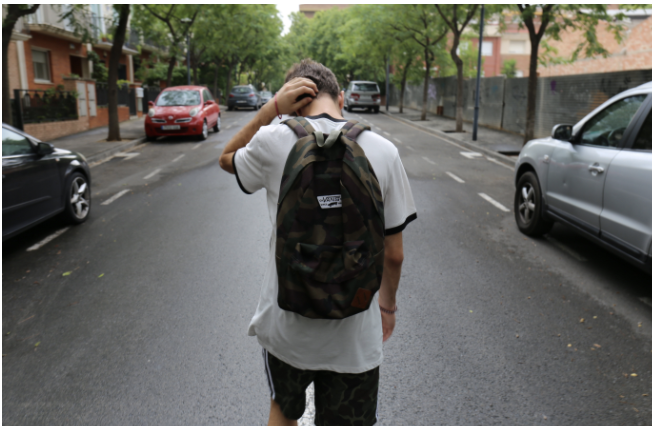Where Does Anxiety Come From?
Anxiety is the body’s natural response to stressful situations, and being nervous or anxious in some situations or seasons of life is merely a part of the human experience. In many ways, nervousness and anxiety clue us in when there is danger, potential discomfort, or some sort of threat and help us deal with difficult or scary situations.
Your teen may experience a bout of nerves or fear when preparing to make a presentation, starting out in a new school, or talking to someone of the opposite sex. This is likely normal. (However, if you are concerned about your child’s level of anxiety, it is always best to consult a professional, just in case.)
While anxiety is not itself a bad or inherently unhealthy thing, too much anxiety can be harmful, especially for children and teenagers. Controlling, irrational fear, on the other hand, has the potential to be quite damaging for your child if not properly dealt with.
How Do I Know if My Teen Has Anxiety?
Anxiety Disorder is not uncommon, but it does come in varying degrees and can be difficult to spot. When talking with your child, here are a few questions you may wish to ask gently:
- “Why do you feel anxious?”: If your child feels anxious for legitimate reasons, this may not be reason enough to pursue therapy, counseling, or other mental health care. However, it may indicate that your child’s emotional health can be improved by addressing the source of anxiety, such as not having enough time to study, feeling unsafe at home or at school, feeling overwhelmed by a packed schedule, or any other circumstantial basis for feeling worried and stressed.
- “How much time do you spend worrying about stressful things?”: If your child is spending an excessive amount of time and energy worrying about things, it could be a sign that they have too much anxiety or that they aren’t dealing with it in a healthy way. For example, worrying about an upcoming test is normal, but if a child experiences stress dreams, loss of appetite, or emotional breakdowns in response to the upcoming test, they may have too much anxiety or may not know how to deal with stress properly.
- “Do you compulsively check on things?”: Repeatedly checking on the same things to ensure they are done correctly is an anxious behavior. If your child is constantly checking things to make sure they haven’t made a mistake, this could be a sign that they are too keyed up and worried.
- “Does anxiety ever keep you from functioning properly or cause you to freeze up?”: Too much anxiety can cause your child to have great difficulty interacting with their peers, completing tests, speaking in front of other people, passing a driving exam, or other important things. Worry is one thing, but paralyzing fear is another.
Tips for Discussing Anxiety with Your Child
When speaking with your child and asking about their stress level, remember to be as gentle and non-confrontational as possible in order to encourage honesty, openness, and vulnerability. Children and teenagers whose stress levels are on the fritz may have difficulty discussing their mental health and the sources of their worry, especially if they do not feel as though they can freely discuss their feelings. However, even if your child is not entirely comfortable discussing their anxiety or answering questions, it is still important to bring it up and offer your support and listening ear.
Besides talking about it with them, one of the best things you can do for an adolescent child who is struggling with anxiety is to remain calm and collected, especially when they are at their most worried. Emotional stability on your part can help create a safe environment for teenagers and children dealing with anxiety.
Help for Parents of Adolescents and Teens with Anxiety
If your child is dealing with anxiety, Therapeutic Solutions is here to help. Our team of compassionate mental and behavioral health specialists can help you and your child understand the problem at hand and figure out the best path forward. Our Adolescent Intensive Outpatient Program (A-IOP) allows you to take advantage of the services your child needs while keeping them in school and maintaining your family’s normal routine as much as possible.
Call (530) 899-3150 to learn more about the services we offer and how we can serve your family.




 Running Brave is an effort to raise awareness about suicide and promote initiatives to prevent it. The event originated in Redding but is making its way to Chico at the end of March for the first time. Hundreds of community members will be in attendance as runners, walkers, volunteers, resources, and event supporters, to show their support and raise funds for the local chapter of the American Foundation for Suicide Prevention. This event will be held on Saturday, March 31st from 8:00 am to 12:00 pm, and includes many ways to support the cause:
Running Brave is an effort to raise awareness about suicide and promote initiatives to prevent it. The event originated in Redding but is making its way to Chico at the end of March for the first time. Hundreds of community members will be in attendance as runners, walkers, volunteers, resources, and event supporters, to show their support and raise funds for the local chapter of the American Foundation for Suicide Prevention. This event will be held on Saturday, March 31st from 8:00 am to 12:00 pm, and includes many ways to support the cause:


